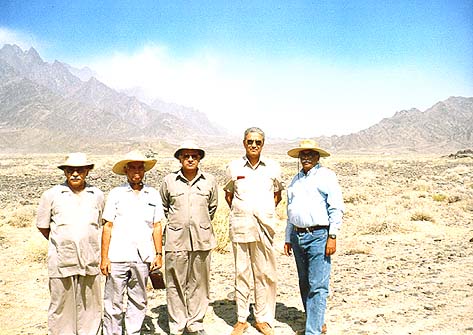

Pakistani conducted nuclear tests in Balochistan in 1998
On May 28 Pakistan will celebrate the ‘Youm-e-Takbir‘, – the ‘Day of Greatness’ to give itself a pat on its back, for the nuclear tests in 1998, under the shadow of an unprecedented revolt against the powerful army. Around the same time, the Baloch diaspora will protest against the Pakistani nuclear tests in Balochistan as Aasrokh – day of mourning.
Pakistan had conducted the tests in utter secrecy in the Chagai district of Balochistan, not even revealing about the tests to the Baloch chief minister and his cabinet who came to know about the tests only through the media.
In a press statement, the Free Balochistan Movement (FBM) said that it would hold simultaneous demonstrations in the UK, the Netherlands and Germany to highlight the negative effects of the radiation on the Baloch community. The FBM statement said that after Pakistan’s 1998 nuclear tests in Chagai, “drought and skin cancer and other radiation-induced diseases have become common among people. It has destroyed the ecosystems of the areas which has damaged the agriculture and livestock of our poor people”.
The Baloch diaspora plans to hold the protests to lobby with the European nations against the nuclear tests which, it says were conducted against the will of the local community. The tests were carried out by Pakistan in the Ras koh mountain range and Chaagi district of Balochistan on 28th May 1998. The Baloch activists also plan to run a social media campaign with the hashtag #NoToPakistaniNukes on May 28.
Pakistan had conducted a total of six nuclear tests between May 28 and May 30, 1998. The country had begun its quest for a nuclear device after India, under then prime minister Indira Gandhi, had tested one in 1974. In response, Pakistani Prime Minister Zulfiqar Ali Bhutto, who was later hanged to death, said famously: “We will eat grass… but we will make a bomb”.
The Baloch have been struggling for an independent Baloch nation soon after the Pakistani Army invaded the independent land in March 1948 and annexed it. At that very moment as the Pakistani Army was marching into Balochistan, its Parliament was debating on how to tackle an imminent Pakistani threat in case of an invasion. Since then, the Baloch tribes, people and various armed groups have been running a lethal struggle against the Pakistani Army and the government for a free nation.
The FBM, which advocates for an independent Balochistan, says that it wants an independent investigation by the UN on the impact of these tests on the people and environment of Balochistan. It also wants areas contaminated by radioactivity to be cleaned of toxicity as well as compensation to be paid to the local Baloch community that has suffered from diseases and deformities.
Also read: Baloch generations suffer deadly diseases left behind by Pakistan’s nuclear blasts
Australia's High Commissioner to India, Philip Green OAM, called Yoga one of India's gifts to…
The Bharat Sanchar Nigam Limited (BSNL) has announced the soft launch of BSNL Quantum 5G…
The Indian Embassy in Iran has said that the embassy will make efforts to evacuate…
India's gross direct tax collections for the financial year 2025-26 rose by 4.86 per cent…
Russian President Vladimir Putin has said that Moscow is not seeking Ukraine's unconditional surrender, but…
Extending his greetings on the 11th International Day of Yoga, Lok Sabha speaker Om Birla…